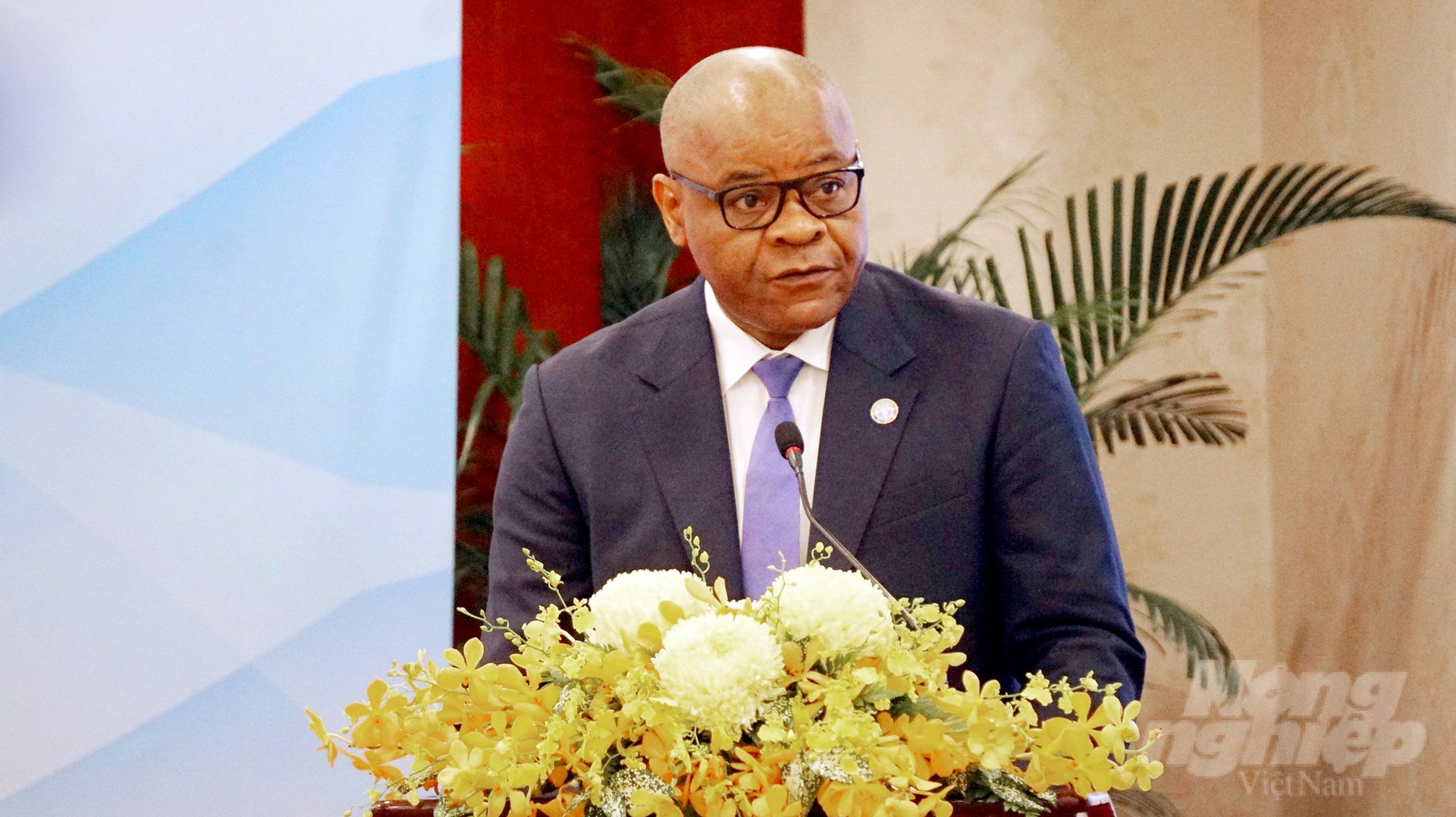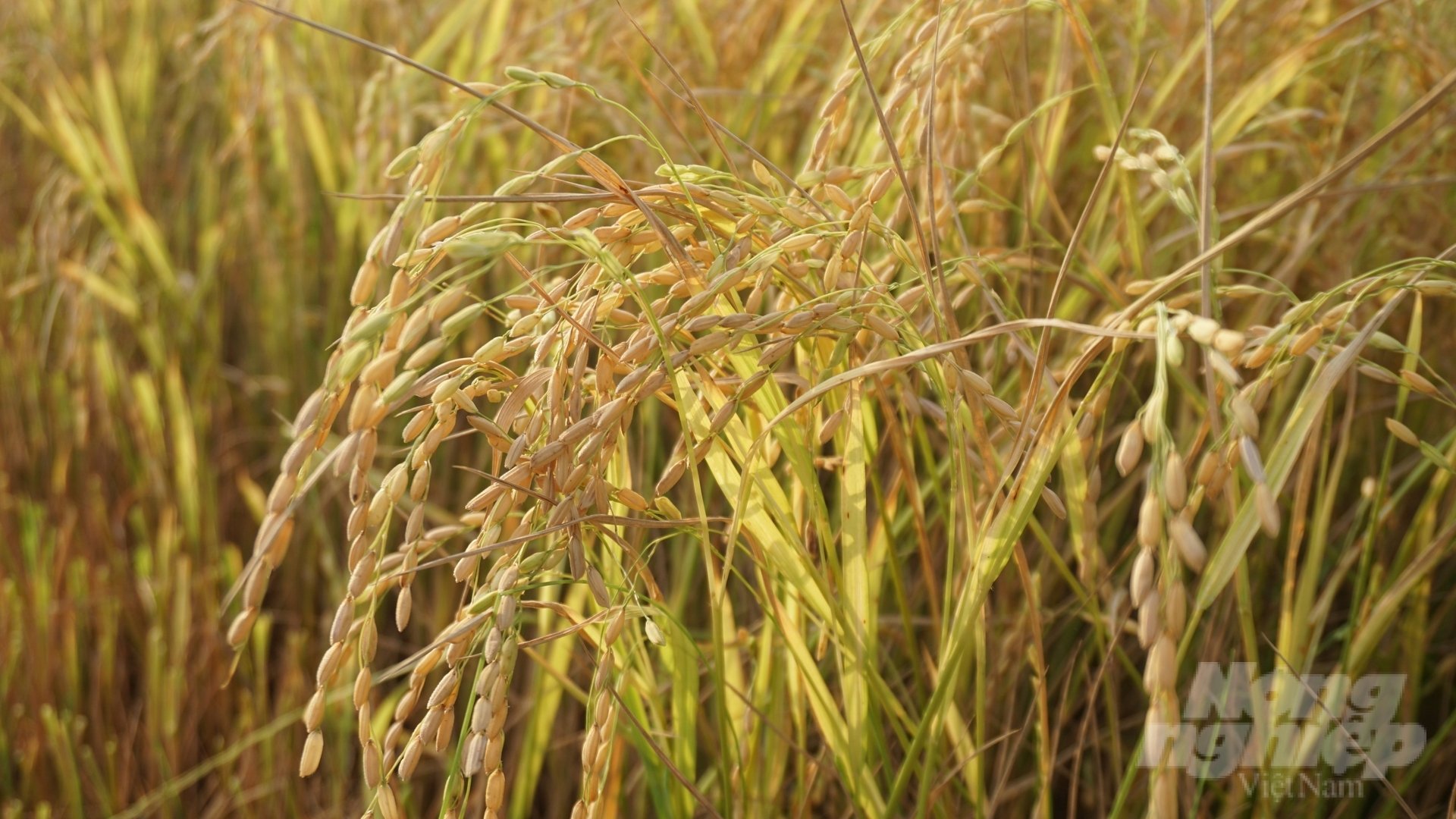June 14, 2025 | 22:32 GMT +7
June 14, 2025 | 22:32 GMT +7
Hotline: 0913.378.918
June 14, 2025 | 22:32 GMT +7
Hotline: 0913.378.918

Mr. Rémi Nono Womdim, FAO Representative in Vietnam, providing remarks at the seminar. Photo: Nguyen Thuy.
The Ministry of Foreign Affairs held a seminar on "Vietnam and Food Security" on June 23. At the event, Mr. Rémi Nono Womdim, FAO Representative in Vietnam, said that according to the State of Food and Nutrition in the world 2022 report, projections are that nearly 670 million people will still be facing hunger by 2030, far from the Zero Hunger target. Between 702 and 828 million people in the world were affected by hunger in 2021. In addition, more than 2 billion people, or almost 30% of the total global population was food insecured.
On a global scale, there are more than 3 billion people who cannot afford a healthy diet. Millions of people die every year because they don't have access to healthy meals. "This is a very important fact that every countries need to know," emphasized Mr. Rémi Nono Womdim.
On the other hand, malnutrition in children is increasingly severe worldwide. Data from FAO have shown that among children under five years of age, an estimated 22 percent were stunted, and 6.7 percent were wasted.
"There are millions of people around the world who suffer from food insecurity whereas the Asia-Pacific region's population is the most affected. Reports have shown that hunger in the Asia-Pacific region is on the rise since 2017. FAO estimated that 460 million people in this region suffered from severe food insecurity in 2021. In addition, 586 million people are suffering from moderate food shortages", Mr. Rémi Nono Womdim detailed.
Progress on nutrition has been slower. Vulnerable groups include women and children especially in rural areas, youth, people with disabilities, ethnic minorities, workers in the informal sector, low-income agricultural households, small-scale producers.
Main drivers of food insecurity and malnutrition include conflicts and insecurity, economic shocks, and drastic weather changes are some of the key causes influencing these negative circumstances.
“The food system is one of the United Nations' top priorities. In the Asia-Pacific region, the SDGs are off-track. We will not be able to achieve these goals before 2060-2061. FAO member states adopted a new strategic framework 2022-2031 since July 2021. The new strategy aims to support the 2030 Agenda through the transformation to more effective, inclusive, resilient and sustainable agrifood system for better production, better nutrition, a better environment and a better life, leaving no one behind", said Mr. Rémi Nono Womdim.
These strategic frameworks cover a wide range of areas, with a focus on cross-sectoral, multi-agency collaboration in technology, innovation, data adoption, human resource management, institutional activities, etc.
According to Mr. Rémi Nono Womdim, the world will face several substantial challenges by 2050. Namely, the global population can rise to as high as 9.6 billion people, and two-thirds of which will live in major cities with a rapid urbanization rate. In addition, the changes in infrastructure structure and economy will result in interdependence between countries for food.
The food system is a chain that includes many different stages such as production, processing, distribution, transportation, consumption, etc. It is only effective when these stages are closely connected.
A sustainable food system must provide nutritious and stable food for everyone. Every country must transform the system to make it more economically sustainable with regards to various social aspects, delivering more benefits to the community. This transformation must also make a positive impact on the environment in which humans live.
"The food systems function as a chain and it is as strong as it weakest link", said Mr. Rémi Nono Womdim.

Vietnam exported over 7,100 million tons of rice in 2022. Photo: Le Binh.
According to Mr. Rémi Nono Womdim, climate change can pose a great challenge for Vietnam. The country needs to promptly address its climate change-related issues. Production models in Vietnam are mostly reliant on high input agriculture which has a negative impact on the environment's ecosystem. Consequently, it is necessary to change the way food is produced and processed.
In a recent World Bank report, farming and agriculture contribute at least 20% of greenhouse gas emissions in Vietnam, with rice farming creating half of that volume with the addition of methane gas.
Secondly, it is necessary to make the agro-food system more resilient to shocks and climate change in order to take timely interventive actions.
Thirdly, Vietnam needs to ensure the sustainable use and recovery of natural resources, with a focus on the Mekong Delta region. It is important to remember that all strategies and policies should contribute to the elimination of malnutrition and food shortages, with an emphasis on the ethnic minority communities.
Fourthly, the innovation and risks brought on new technologies must be managed in order to deliver and improve sustainable food systems.
Vietnam is currently transitioning to a green, low-carbon, climate-resilient agriculture. The transformation is expected to create new employment opportunities. Most notably, the transformed rice farming industry is able to create millions of new jobs, especially for younger people.
"Vietnam has excellent trade transactions, with its agricultural export turnover reaching 52 billion USD in 2022. Vietnam has considerable opportunities and potential for exports in the region as well as Western countries. The country can diversify its target markets in the future by adopting green agriculture, applying smart agricultural solutions to reduce emissions, adapting to the impacts of climate change on agriculture, and ensuring sustainable food security", concluded FAO Representative in Vietnam.
Jointly with the Government, FAO has developed a National Cooperation Program with Vietnam for the years between 2022 and 2026. The progam primarily focuses on 4 priority contents including: One Health; Responding to climate change, environment, and resource management; Food safety, sustainable production and consumption, equitable livelihoods for all; governance, gender and people with disabilities.
This National Cooperation Program is consistent with Vietnam's socio-economic development strategy for years between 2021 and 2030; Socio-economic development plan for years between 2021 and 2025; and the United Nations' Sustainable Development Cooperation Framework for years between 2022 and 2026.
Translated by Nguyen Hai Long

(VAN) The working delegation from the Ministry of Agriculture and Environment conducted an important trip to the Netherlands to strengthen strategic partnerships and sustainable development in the agricultural sector.

(VAN) The letter ‘A Plea from the Ocean’ not only evokes emotion but also awakens the human conscience to the responsibility of protecting life on Earth.

(VAN) The Department of Agriculture in South Africa has announced the country’s first mass vaccination of poultry to prevent local birds from contracting avian influenza.

(VAN) Establishment of the Mekong Delta Regional Agricultural Linkage Center, aiming for a closed value chain, deep processing, trading platforms, and international market connectivity.

(VAN) Gia Lai province has recently recorded 460 rare species of animals and plants, contributing to forest conservation and biodiversity planning in the region.

(VAN) Ms. Caroline Beresford, New Zealand Ambassador to Vietnam, expressed confidence that agricultural cooperation between Vietnam and New Zealand will develop sustainably, be climate-resilient, and promote gender equality.

(VAN) Vietnam reaffirms its commitment to international cooperation in fostering sustainable and responsible fisheries while ensuring resilient livelihoods for small-scale fishing communities.